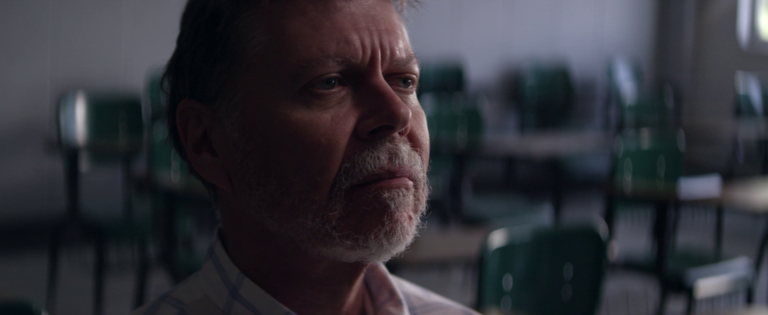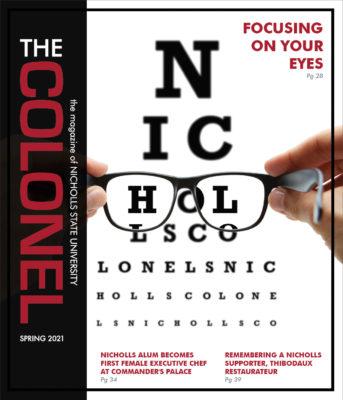The Economics of Change
January 17, 1977. Powell 213. That was the date and the location that Dr. Donald Boudreaux’s (BA ’80) life would change forever.
Though today he is a professor of economics at George Mason University and the director of the Center for the Study of Public Choice, as a teenager he was more interested in “football, beer and girls.” He thought his future was working at Avondale Shipyard like his father and grandfather. School was not a priority for the New Orleans native.
But his mother encouraged – well, maybe twisted his arm a bit – to go to college for at least a year. So, he enrolled at nearby Nicholls State University, because it was “the only place I could go.”
After a semester of partying with friends, which included getting caught cheating on a math test, he came back to his mom and tried to convince her college just was not for him.
“She yelled at me, that was her response. She said, ‘You promised you would go for a year,’” Boudreaux says.
He convinced her to adjust their arrangement. He would enroll in Monday and Wednesday classes, but stay home Tuesdays and Thursdays and work at the shipyard. That is why he signed up for Dr. Michele Francois’ principles of microeconomics class. Because it fit his schedule.
But his life changed forever when Dr. Francois illustrated the 1973 oil crisis using the supply-and-demand curve.
“It was the most beautiful thing I had ever heard in my life,” he says, sitting in the same room 42 years later. “I remember looking at that chalkboard and for the first time in my life I had the sensation of understanding something at an intellectual level. This analytical tool caused me to see the world in a very different way.”
He would never receive a grade less than ‘A’ again. He spent less time out drinking and more in the Library. Sometimes, he spent so much time at the library that he would miss the bus and his dad would have to drive from Jefferson Parish to come pick him up.
“Suddenly, I was in the library and I was reading books. My parents didn’t know what happened to me,” he says.
Dr. Francois then introduced Boudreaux to another economics professor, Dr. William Field. Where Dr. Francois changed his life in an instant, it was Dr. Field that changed how Boudreaux approached the field of economics. Those two became two of the “most incredibly important people in
my life.”



“If I hadn’t come to Nicholls, I don’t know what would have happened to me,” Boudreaux says. “My life would have been completely different. I might have been equally happy, but I owe this place a lot. I owe Nicholls an incredible amount.” – Dr. Boudreaux
“Dr. Field became my mentor,” Boudreaux says. “Some of the happiest moments in my life are sitting in his office and talking about economics and political philosophy.”
But the influence of Dr. Francois and Dr. Field goes beyond economics. It was how they taught economics that caught the attention of Boudreaux. While many economists center their discussions of the economy around numbers, his teachers used stories to illustrate how the world worked.
And that is how Dr. Boudreaux teaches his students today.
“That is how human beings learn, through stories,” he says. “Many of my fellow economists don’t tell stories, they want to impress the world with how much math they know and how much jargon they can throw around. Math is different from economics. I teach it the way Dr. Francois taught it to me. She made it relevant because she tied it to something concrete in the real world. That’s how I fell in love with the subject.”
He remains in touch with Dr. Field, and he stayed in touch with Dr. Francois until she died in 2014. To this day, he still tells the story to his undergrads about her class and the impact she had on his life.
“I doubt any professional economist has ever heard of her, and I don’t think she ever published much of anything, but she was a fantastic teacher,” he says. “She was really good, and she was really accessible. Because of her, I couldn’t get enough of this economics stuff. She made me fall in love with economics.”
If it had not been for that class, Boudreaux believes he would not have become an economist. That means he doesn’t earn his masters at NYU, his doctorate at Auburn University or his law degree at the University of Virginia. In that scenario, he would not have lectured all over the country and in Canada, Latin America and Europe. He probably would not have had articles published in the Wall Street Journal, Washington Times, Supreme Court Economic Review or Southern Economic Journal, among others.
“If I hadn’t come to Nicholls, I don’t know what would have happened to me,” Boudreaux says. “My life would have been completely different. I might have been equally happy, but I owe this place a lot. I owe Nicholls an incredible amount.”
– Jacob Batte



